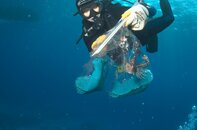- Messages
- 54,470
- Reaction score
- 8,575
- # of dives
- 500 - 999
Some studies from the Bahamas report at 80% native fish loss in areas.Strictly from a biological perspective...does anyone know of comparative studies being done in Roatan concerning lionfish populations and the possible effects of the culling efforts? I'm wondering specifically whether they can actually see any net effect. Of course, the data all the way around (concerning the invasion) is pretty sketchy simply because it's all new and changing so dynamically, but it would be good to know what the effects might be.







